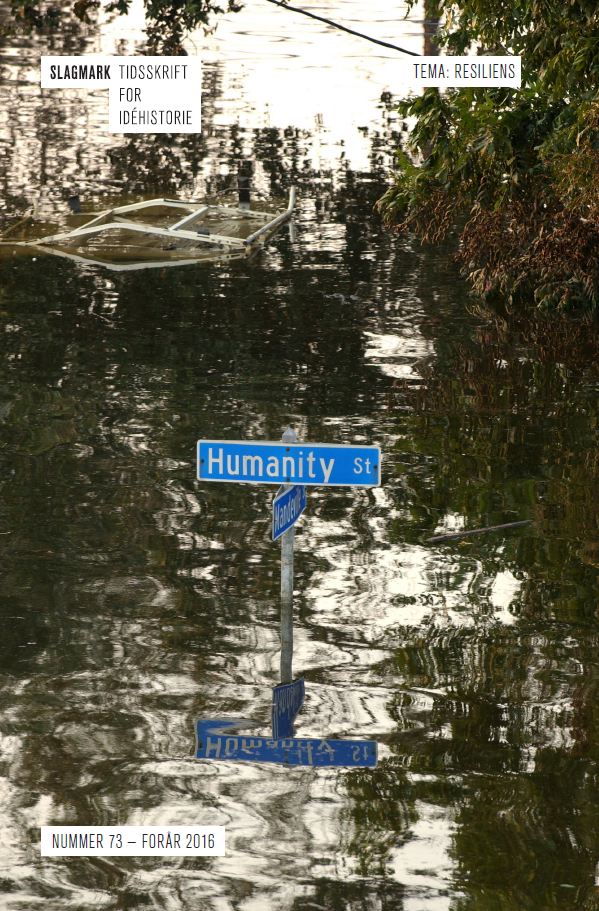Resiliens, normativitet og sårbarhed
DOI:
https://doi.org/10.7146/sl.v0i73.107231Nøgleord:
resilience, vulnerability, normativity, victim, natalityResumé
Does the critical discourse about resilience reiterate the problematic dichotomy between suffering and agency that the concept of resilience inscribes? In this discussion piece, I engage with Brad Evans’ and Julian Reid’s reflections on resilience. Although I share with Evans and Reid a normative critique of resilience, I am critical of their discussion of vulnerability. Rather than arguing that vulnerability precludes political transformation, as Evans and Reid do, or that vulnerability enables political coalition, as in Judith Butler’s account of precarity, one should ask: how is vulnerability framed? I argue for framing vulnerability through a critical theory of the victim which explores the interconnections between injurability and agency rather than treating them as oppositional terms.
Referencer
Alexander, J. C. (2009). Remembering the Holocaust : A Debate. Oxford: Oxford University Press.
Améry, J. (1999). At the Mind’s Limits. London: Granta Books.
Butler, J. (2009). Frames of War : When is Life Grievable? London: Verso.
Chandler, D. (2012). Resilience and Human Security : The Post-Intervention Paradigm. Security and Dialogue, 43(3), 213-229.
Dillon, M. (1995). Sovereignity and Governmentality: From the Problematics of the ‘New World Order’ to the Ethical Problematic of the World Order. Alternatives: Global, Local, Political, 25, 323-368.
Dillon, M., & Reid, J. (2000). Global Governance, Liberal Peace, and Complex Emergency. Alternatives: Global, Local, Political, 25, 117-143.
Dillon, M., & Reid, J. (2001). Global Liberal Governance : Biopolitics, Security and War. Millenium : Journal of International Studies, 30(1), 41-66.
Evans, B., & Reid, J. (2013). Dangerously Exposed : The Life and Death of the Resilient Subject. Resilience : International Policies, Practices, Discourses, 1(2), 83-98.
Murphy, A. V. (2009). Violence and the Philosophical Imaginary. Albany: State University of New York Press.
Nissum-Sabat, M. (2009). Neither Victum Nor Survivor : Thinking toward a new humanity. Lanham, MD: Lexington.
O’Malley, P. (2010). Resilient Subjects : Uncertainty, Warfare and Liberalism. Economy and Society, 39(4), 488-509.
Schott, R. M. (2010). Introduction : Birth, Death, and Feminiity. i R. M. Schott (Red.), Birth, Death, and Femininity ; Philosophies of Embodiment (s. 1-24). Bloomington: Indiana University Press.
Schott, R. M. (2014). ‘Not Just Victums ... But’ : Towards a Critical Theory of the Victim. i H. Widdows & H. Marway (Red.), Women and Violence : The Agency of Victims and Perpetrators. Hampshire: Palgrave.
Schott, R. M., & Søndergaard, D. M. (Red.). (2014). School Bullying: New Theories in Context. Cambridge: Cambridge University Press.
Spiegelman, A. (1987). Maus. London: Penguin.
Walker, J., & Cooper, M. (2011). Genealogies of Resilience : From Systems Ecology to the Political Economy of Crisis Adaptation. Security Dialogue, 42(2), 143-160.
Young, I. M. (1997). Intersecting Voices. Princeton, NJ: Princeton University Press.
Publiceret
Citation/Eksport
Nummer
Sektion
Licens
Ophavsretten til artiklerne i Slagmark deles mellem forfatter og Forlaget Slagmark.
Artikler og tekstmateriale publiceret i Slagmark må citeres, downloades og videresendes for ikke-kommerciel brug, under forudsætning af normal akademisk reference til forfatter(e) samt tidsskrift, årgang, nummer og sider.
Brug og distribution af tekstmateriale både i form af papirkopier og elektroniske kopier, til undervisningsbrug på uddannelsesinstitutioner og intern brug er tilladt efter aftale med Copydan Tekst & Node. Brugen skal ske inden for aftalens rammer.
Artikler og tekster må kun genudgives med eksplicit tilladelse fra forfatter(e) og tidsskriftet med en anerkendelse af værkets første publicering i nærværende tidsskrift.





